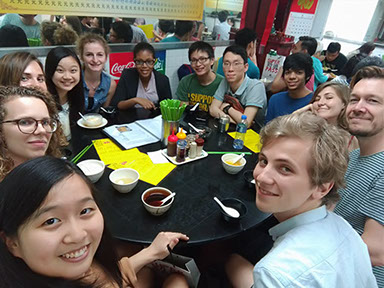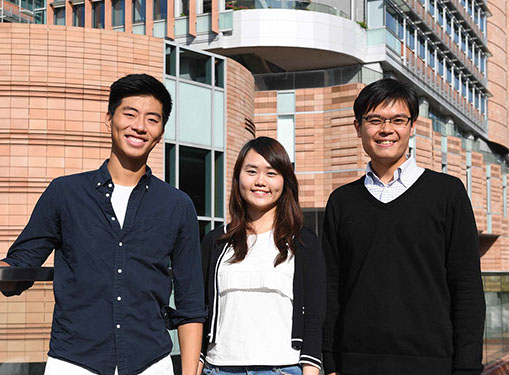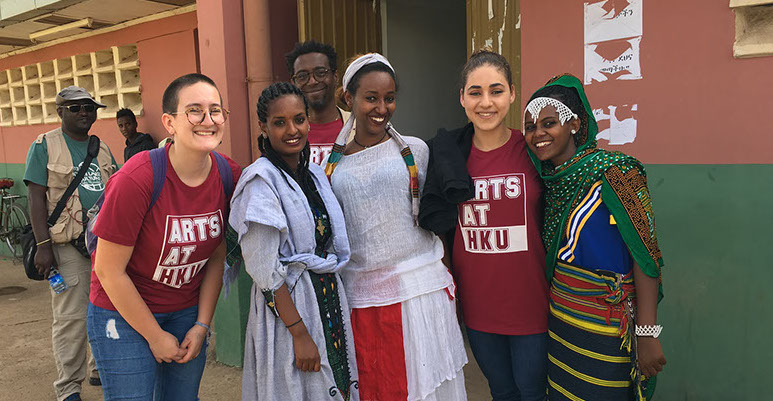Vision and Mission
Message from the
President and
Vice-Chancellor
Teaching and Learning
Research and Innovation
Knowledge Exchange and
Technology Transfer
The University Profile
An Extract from
the University’s
Annual Accounts 2016-17
Officers of the University
The Court
Vision and Mission
Message from the
President and
Vice-Chancellor
Teaching and Learning
Research and Innovation
Knowledge Exchange and
Technology Transfer
The University Profile
An Extract from
the University’s
Annual Accounts 2016-17
Officers of the University
The Court

The Review 2017

PDF Version
Past Issues
E-Book
TEACHING AND LEARNING
CROSSING BOUNDARIES
HKU encourages learning that takes students beyond their chosen discipline, of which the Common Core is the most obvious example. We have been adding an international element to such learning. The Common Core is in the early stages of developing GLADE (Global Liberal Arts Design Experiments) with initial outreach to 70 local and non-local universities, and the University offers dual undergraduate degrees with institutions in Europe and North America, some of which have an interdisciplinary focus. Our internship initiatives also broaden students' experiences abroad and in Hong Kong.

Students from Utrecht University and HKU, including Janet Lam Tin-kei (bottom left), share lunch in Hong Kong.
Seeing How Others Work
The Common Core offers students a chance to participate in
the Transdisciplinary Undergraduate Research Exchange in collaboration with students from Utrecht University. The
students initiate and organise research around a topic of their interest, planning their work in the winter then visiting each
other’s campuses in the spring to carry out the work.
Janet Lam Tin-kei (Year 4 MBBS / MPH) was part of a group that put together a video, written report and presentations based on interviews with disabled people, NGO representatives and sex workers. The work contrasted with her medical studies and gave
her an opportunity to work with students in other programmes – something she had not been able to do since completing her Common Core requirements in her second year.
“Working with students from different disciplines was really challenging. My groupmates worked so differently! I came to appreciate how our differences could facilitate our work so we could achieve something that would not be possible if we’d stayed in our comfort zones and disciplines,” she said.
Rachel Engazou (second right) on a field trip to Ethiopia. Her Dual Degree included a minor in African Studies.
One Programme, Two Degrees
The first cohort of the HKU-Sciences Po Dual Degree graduated in 2017. The aim of the degree is to equip students with an in-depth understanding of global issues from Asian and European perspectives and develop networks in both places.
Students spend their first two years at one of Sciences Po’s campuses in France studying towards their multidisciplinary Bachelor of Arts which covers history, law, economics, sociology and international relations, and the final two years at HKU with one of three faculties – Business and Economics, Arts, or Social Sciences.
Rachel Engazou was in the first graduating class. “I expected to learn a lot about China and its role in global governance, and I have not been disappointed. In the Western world we tend to view China with suspicion, but I learned that Chinese politics is very complex and it is a mistake to have such biases,” she said. “HKU and Sciences Po have drastically different systems and it could be stressful sometimes navigating the two, but this also helped me realise I could deal with such a situation and I gained confidence from that.”
Interning with a Difference
HKU’s Centre of Development and Resources for Students (CEDARS) organises internships for students that go beyond work experience. The Global Career Springboard Scheme gives them a chance to undertake internships in more than 50 locations around the globe, while the Intern with Founder Programme lets them spend up to one year, part-time or full-time, working closely with the founders of start-up companies, innovation-oriented companies and entrepreneurial social ventures.
Bobby Cheung King-ho (Year 4 BA) spent a summer working with the Hong Kong Economic and Trade Office in Tokyo, where he was able to polish his language skills, participate in organising activities for the 20th anniversary of the Hong Kong Special Administrative Region, and gain insights into Japanese work culture. “I had

Innovative interns (from left) David Boli Han, Charmaine Cheung Pui-ying and Bobby Cheung King-ho.
thought Japanese corporations were very conservative and traditional, but my internship helped me to develop a more open mind and appreciate that their approach is aimed at achieving excellence,” he said. Charmaine Cheung Pui-ying, who was completing a double-degree in Business and Law, did a six-week internship with a property investment and management company in Edinburgh where she conducted market research, made a presentation on her findings and stepped out of her comfort zone as the only Asian in the firm. “The internship offered me the opportunity to work with people from different backgrounds, which has strengthened my people and communication skills. There was also personal growth because I was far from home and had to take care of myself and solve problems on my own,” she said.
David Boli Han [Year 2 BEng(CompSc)] interned in Hong Kong with the founder of QWeUs, a mobile game development company. He was tasked with helping to write code and adapt software for use in their apps. “From a technical standpoint, I learned a lot about good programming practices in the industry and how to design good web and mobile applications. From a business standpoint, I learned how important worker versatility is to a start-up because they have few employees and each team member has to be able to do a variety of tasks. Clear and effective communication is important,” he said. David hopes to form his own company in future, but with “my eyes open to the difficulties of creating a successful start-up in the tech industry.”
